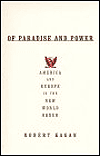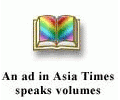| |
BOOK
REVIEW
Americans
are from Mars, Europeans from Venus
Of Paradise and Power, America
and Europe in the New World Order,
by Robert Kagan
Reviewed by Sreeram Chaulia

Fissures in trans-Atlantic relations have never
appeared more evident than during the lead up to
the US-led invasion of Iraq. While George W Bush
has used the phrase "moment of truth"
for both the United Nations and Iraq, another
moment of truth is for America and Europe to
face the reality that they no longer share the
same strategic culture or common view of the
world. Washington Post columnist Robert Kagan's
new book enters into a brilliant dialectic on
the material and psychological reasons for a US-EU
divorce. The author, a former US State
Department official, finds the strategic
decoupling of the two "frightening"
but inexorable, and recommends some remedial
measures in conclusion.
Kagan's thesis is that Europe is "entering
a post-historical paradise of peace and relative
prosperity, the realization of Immanuel Kant's
perpetual peace". America, on the other
hand, "remains mired in history, exercising
power in an anarchic Hobbesian world where
international laws and rules are
unreliable" (p 3). By this reckoning, the
labels "old Europe" and "new
America" that are circulating these days
should be reversed. Europe favors peaceful
responses to international problems, preferring
negotiation, diplomacy and persuasion to
coercion. It is quicker to appeal to
international institutions, conventions and
opinion to adjudicate disputes. America resorts
to force more often, is less patient with
diplomacy, skeptical about international law and
more willing to operate outside its strictures.
Though there cannot be monolithic categories
called "Europe" and
"America" to contrast, it is
nevertheless true that "Powell and Rumsfeld
have more in common than do Powell and the
foreign ministers of France, Germany, or even
Great Britain" (p 6).
Why do the US and EU act as they do today? After
all, in the early years of the American
Republic, US statesmen abjured war, assailed
European power politics and empires as atavistic
and claimed an aversion to military power, as
France, Germany and Britain conquered the Third
World with brute force. When the European great
powers were strong and powerful, they believed
in strength and martial glory. When America was
weak, it practiced the strategies of indirection
and persuasion. Today, the tables have been
turned due to an ever-widening power gap,
military and economic, between the two.
"Now that the United States is powerful, it
behaves as powerful nations do." Now that
the western European countries have been cut
down to size after decolonization, "they
see the world through the eyes of weaker
powers" (p 11).
Trans-Atlantic disparity of power started from
World War I, which was a damaging blow to
European strength and confidence. Appeasement of
Nazism was a strategy based on the post-war
weakness of Britain, France and Russia, stemming
from genuine inability to contain a rising
Germany. The interregnum years between the two
world wars saw increasing European dependence on
American financial institutions. World War II
all but destroyed European nations as global
powers by removing their ability to project
sufficient force overseas to maintain colonies
in Asia, Africa and South America. After 1945,
the once-global reach of European powers no
longer extended beyond the their own continent.
In the early Cold War years, West European
economies were too feeble to support sufficient
military capacity for even self-defense.
American military guarantees and troops defended
them against Soviet encroachment. In the later
Cold War years, Europeans allegedly became so
dependent on US military assurances that they
started "free riding" on Uncle Sam and
neglected indigenous defense completely.
European leaders of the 1970s and 1980s were
totally disinterested in closing the military
gap with America.
When the Maastricht Treaty bonded together West
Europe into a single political and economic unit
in 1992, there were hopes expressed on both
sides of the Atlantic that the EU would make
"Europe" an alternative pole in the
post-USSR era and compete with the US not only
economically and politically but also
militarily. What actually happened in the past
decade was "not the rise of a European
superpower but the further decline of Europe
into relative military weakness compared to the
United States" (p 22). The EU lacked the
wherewithal to introduce and sustain a fighting
force in potentially hostile territory, far from
home, even within Europe. The military
technological gap opened ever wider in the
1990s, rendering the EU unable to launch
devastating attacks from safe distances like the
US could.
America did not slacken defense sector
modernization once the Soviet Union
disintegrated. It assembled an awesome military
force that could project power into several
distant regions at once (hence Defense Secretary
Donald Rumsfeld's claim that the US could wage a
"two-front war" in the Middle East and
in the Korean peninsula). As European
governments used the end of the Cold War as an
"opportunity to cash in on a sizable peace
dividend", slashing defense budgets to
below 2 percent of GDP, US administrations did
not view the collapse of the USSR as a
"strategic holiday". US military might
and interventions proliferated, starting with
the invasion of Panama (1989), the Persian Gulf
War (1991), Somalia (1992), Haiti (1994), Bosnia
(1995), Kosovo (1999), Afghanistan (2001) and
now, Iraq.
Kagan argues that the present strategic culture
disharmony between Europe and America stems from
this expanding 90-year power gap. "Those
with great military power are more likely to
consider force a useful tool of international
relations than those who have less military
power." (p 27) Traditions of independence
like Gaullism in France and Ostpolitik in
Germany had existed as minor irritants to
trans-Atlantic unity even during the Cold War,
but the cracks were papered over in the name of
"Western oneness". Now, in the absence
of the "Red menace", substantial
squabbles on what constitutes an intolerable
threat to world order are no longer manageable.
European liberals of the d'tente period viewed
America as too confrontational, militaristic and
dangerous. Now, even conservative Europeans like
Jacques Chirac hold this opinion.
European publics and leaderships contend that
Americans have an unreasonable demand for
"perfect security" and go about
attacking even the remotest threat. Kagan thinks
that this is not some sort of
"progressive" thinking on the part of
Europeans but simply their relative weakness
which is speaking. "Americans, being
stronger, developed a lower threshold of
tolerance for Saddam Hussein" (p 31).
Another practical reason for EU opposition to
war is the fact that Europeans do not perceive
themselves as primary targets of a country like
Iraq, "because they no longer play the
imperial role in the Middle East that might have
engendered the same antagonism against them as
is aimed at the United States" (p 36).
On issues like the ABM Treaty, the International
Criminal Court and the Kyoto Protocols, European
hostility to American unilateralism is similarly
self-interested. Like the sour grapes
phenomenon, western Europeans "naturally
oppose allowing others to do what they cannot do
themselves" (p 38). Far from being a EU
strategy of gradually asserting itself as an
alternative locus of power against America,
Brussels disputes American hyperpuissance
(former French Foreign Minister Hubert Vedrine's
term for a worryingly powerful US) and
disparages Washington as an "international
cowboy" due to effeteness and frustration.
EU frustrations about American "Wild
West" methods in foreign policy were on
display during the Kosovo war that was fought
with US equipment and according to US military
doctrines. Though the Balkan crisis was in the
EU's backyard, American war strategists dictated
terms and outcomes. According to NATO supreme
commander US General Wesley Clark, "It was
always the Americans who pushed for the
escalation to new, more sensitive targets and
always some of the European Allies who expressed
doubts and reservations" (p 48). From the
Kosovo experience came the US prejudice that EU
help was a ruse to tie down American military
prowess in futile political solutions. In the
2001 Afghanistan war, European offers of
activating military aid to the US under Article
5 of NATO was viewed by the Pentagon as a
"booby trap" to moderate overwhelming
use of force.
Besides the power gap, Kagan also sees a
parallel change in new Europe's philosophy of
power that has affected EU-US ties. "Modern
European strategic culture represents a
conscious rejection of the European past, a
rejection of the evils of European Machtpolitik"
(p 55). Europeans today are not ambitious for
power, especially military power. In the words
of Tony Blair's controversial foreign policy
aide, Robert Cooper, Europe today "lives in
a post-modern system where raison d'etat and the
amorality of Machiavelli have been replaced by a
moral consciousness in international
affairs" (p 57). European Commission
President Romano Prodi maintained, "Rule of
law has replaced the crude interplay of
power" in European minds.
The "European Miracle", centered on
resolution of age-old Franco-German rivalry and
warfare, has grown so embedded in European
psyche that the EU's new mission is to export
the notion of regional integration and peace.
"America's power and its willingness to
exercise that power unilaterally constitute a
threat to Europe's new sense of mission",
by denying universal validity of Europe's new
ideals and the underpinnings of the entire
"European project". Strong European
rebukes of the US as "outlaw" and
"rogue colossus" spring from this
threat to new European values.
Looking into the future, the US is planning to
spend an astronomical $400 billion per annum on
defense, while Europe lacks the slightest
intention of raising its own minimal expenditure
on military due to demographic and social
welfare priorities. This will further estrange
relations between regions that were once
considered as one unified "West".
Islamic fundamentalism is a threat to the
Western liberal ideal, but it cannot "force
the West to prove itself unified and coherent,
as Soviet communism once had" (p 81). The
US has shifted inevitably into a more narrow
nationalism that gives few concessions to
international public opinion and shows less
deference to Western allies. Since George W Bush
has taken charge in Washington, "The West
as a functioning concept in American foreign
policy has become dormant" (p 84). To
growing European horror, the US has decided that
the "language of force" is the only
way to solve world problems and is aggressively
pursuing it.
Americans, says Kagan, "Do not believe we
are as close to the realization of the Kantian
dream as Europeans do" (p 91). The
distinctly American assumption that their
country is the "indispensable nation"
is gaining ground in Washington. "Because
they are so powerful, Americans take pride in
their nation's military and their nation's
special role in the world," a role that can
be performed without European constraints (p
99).
Given the mood of self-interested action and
arrogance in Washington, Kagan suggests that the
only way for a modicum of agreement inside
"the West" is for Europe to build up
its military capabilities to bridge the power
gap, at least marginally. The Bush
administration, on its part, could take more
care to show what the founders of the American
Republic called a "decent respect for the
opinion of mankind".
Though written with fluent and original thought,
Of Paradise and Power fails to delve into
the meaning of "power" and mistakenly
assumes EU military weakness (lack of "hard
power") as lack of power altogether. In the
long run, with the US economy entering a
possible deflationary cycle, a different
"power gap" will emerge between the US
and EU economies and currencies. Seventy percent
of world trade is North-North trade and the
likely fallout of US-EU economic competition
will have far-reaching consequences. Defense
spending, too, cannot be maintained at
exorbitant levels by the US if its domestic
economy does not recover. Even more crucial, as
Europe avoids entanglements and wars in the
third world and takes pro-UN stands, it is
likely to gain in international political
capital vis-a-vis a much-disliked US hegemon.
American Martians and European Venetians might
meet on a more level playing field in 20 years
time.
Of Paradise and Power, America and Europe
in the New World Order, by Robert Kagan.
Alfred A Knopf, New York, 2003. ISBN:
1-40004093-0. Price: US$18, 103 pages.
(©2003 Asia Times Online Co, Ltd. All rights
reserved. Please contact [email protected]
for information on our sales and syndication
policies.)
|
| |
|
|
 |
|








